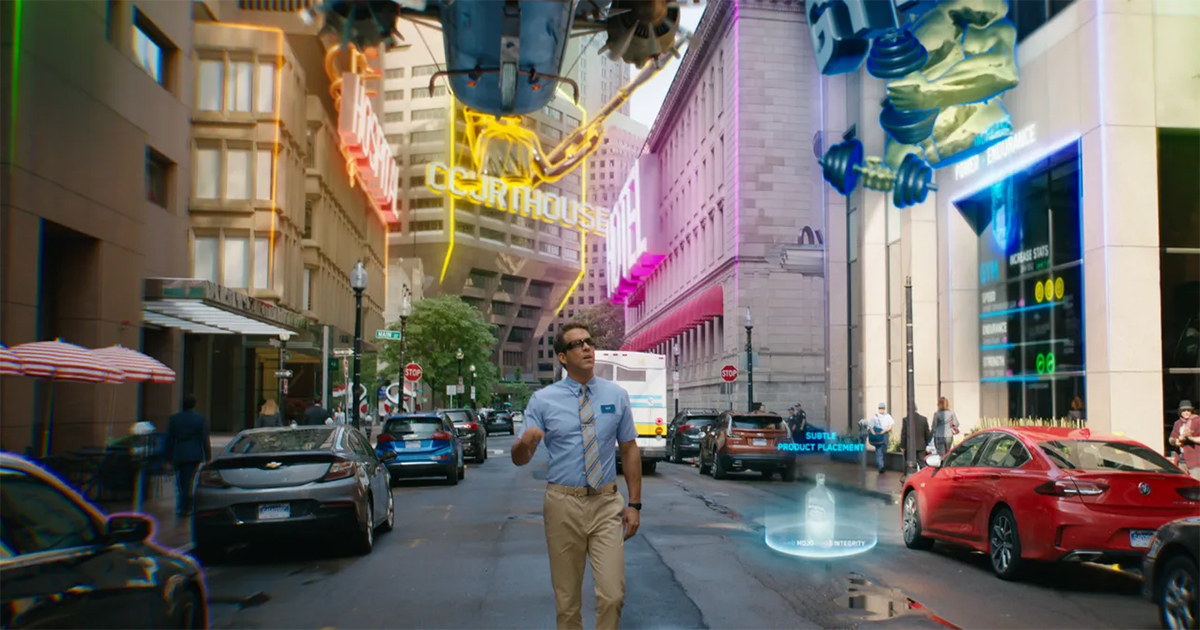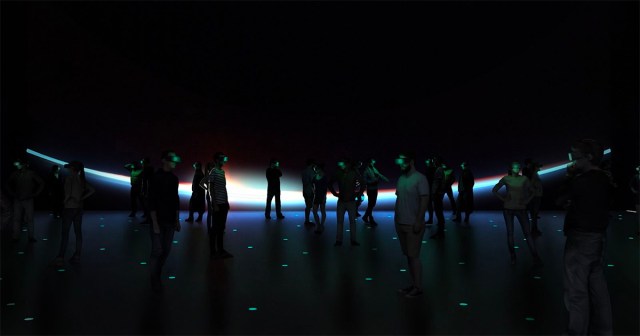
Free Guy starring Ryan Reynolds is the latest in a long line of films leaning into computer gaming and virtual reality.
Taking our cue from an article at Cinelinx, let’s take a trip down memory lane.
Tron (1982) is a good starting point. A movie that in dramatic terms never did stand up, but its use of CGI to put the audience inside a computer game with Jeff Bridges will forever be pioneering.
“Rather than experiencing an artificial reality, he experiences the reality of the inner workings of a computer,” says Cinelinx’s GS Perno. “So, on one hand it really wasn’t virtual reality as we would later think of it, but it was an important step in that direction. Most importantly, Tron reinforced the idea of virtual reality being perpetrated by a computer.”
In Tron director Brett Leonard’s Virtuosity, the roles are reversed — a computer entity in a police training sim designed to catch serial killers jumps over to our reality and Denzel Washington has to hunt it down.
Brainscan, eXistenz, and Arcade, from the mid-1990s, depict computer gaming as a video nasty. David Cronenberg’s body horror eXistenz features a scene, inside a VR game called transCendenZ, in which the character constructs a “gristle gun” out of food.
READ MORE: The Evolution of Virtual Reality in Film (Cinelinx)
The Chinese boxes of a storyline inside a storyline inside a story — from which the characters may never escape — is a recurring theme of virtual reality themed stories (Christopher Nolan’s Inception or The Matrix being prime examples). It can leave the dreamer or player drug dependent, brainwashed or dead.
The virtual reality in these films is mis-used or manipulated for nefarious purposes. All these cases exhibit technophobia. Characters are often drawn in against their will, or at least without realizing what is happening to them. Even 1995’s Jumanji, if played for family adventure, dealt with the horror of being trapped in a game.
By the 90s, concepts of virtual reality were becoming more advanced and multi-dimensional but no less sinister. It’s still impossible to tell whether the events of Total Recall (1990) are all a dream or reality, which is director Paul Verhoeven’s genius. Inspired by the paranoid and hallucinogenic mind of Phillip K. Dick, the sci-fi feature has construction worker Arnie (Dennis Quaid) visit Rekall, a company that specializes in dreams. He chooses a dream of visiting the colonized Mars, only to find himself stuck in that reality (unless he was in fact the rebel leader all along).
“Virtual reality is the idea of replacing a person’s sensory inputs with those that are created artificially, such as by a computer. While today’s VR devices like Oculus give you some sensation of entering an alternate reality, but you still maintain sensory connections with the real world. ‘Real’ virtual reality won’t be possible until you can physically leave your body behind and travel to a new place with only your mind/consciousness.”
— GS Perno
The Game, directed by David Fincher, mined a similar setup as Michael Douglas’ man who has everything banker is given a birthday present of a visit to Consumer Recreation Services, promising that it will change his life. Turns out his memories aren’t permanently altered, but he’ll never look at things the same way again.
At the end of the decade, the violent mind invasion experienced by Arnold Schwarzenegger as he goes over to the other side at Rekall is revisited by Morpheous on Neo in The Matrix. Here, Neo’s brain is literally plumbed into the alt universe. (Or is he? Didn’t he take the red pill and venture into the rabbit hole?)
Perno contrasts this with Cameron Crowe’s 2001 Vanilla Sky. “In The Matrix, the majority of the human species is being held in a state of capacity by plugging our minds into a virtual reality simulation of the real world. In Vanilla Sky, the main character is placed in a state of suspension because of his deteriorating physical state, while his mind lives in a virtual reality to prevent him from dying.”
More recently, movies like Gamer, Ender’s Game, Spy Kids 3D: Game Over, and Ready Player One literally run with the idea of virtual reality being tied into a video-game like experience.
Reminiscence, the recently released sci-fi noir starring Hugh Jackman, is about a PI able to interrogate past with a machine that taps into people’s memories. It recalls Kathryn Bigelow’s underrated thriller Strange Days (1995), about Ralph Fiennes’ attempts to uncover the truth behind the murder of a prostitute by means of experiencing a person’s memories and physical sensations.
Memory, or pre-cognitive memory eavesdropping as it appears in Minority Report (another Dick adaptation), showcase multiple simultaneous possible realities, while the films of Christopher Nolan consistently question reality. In Inception,for example, the characters (who are drugged and physically tethered just like Quaid, Neo, and the VR gamers of Ready Player One or eXistenz) travel to someone else’s dream.
“This is VR commercialized in a manner that makes sense for 2020. Here, the technology itself is not necessarily dangerous — it is about who is controlling the technology. We see the shift away from the potential of computers being this frightening thing we don’t understand, to the fear of humanity misusing the technology they do understand.”
— GS Perno
Ready Player One, Perno writes, showcases an updated prediction for where VR could be headed such as microtransactions, and an increased connection between real-life and video games.
“This is VR commercialized in a manner that makes sense for 2020. Here, the technology itself is not necessarily dangerous — it is about who is controlling the technology. We see the shift away from the potential of computers being this frightening thing we don’t understand, to the fear of humanity misusing the technology they do understand.”
What all these films have in common is a sci-fi element. They are warnings of addiction, they are nightmares of being trapped, they are political allegories about the danger of control. But they aren’t real, are they?
“Virtual reality is the idea of replacing a person’s sensory inputs with those that are created artificially, such as by a computer,” writes Perno. “While today’s VR devices like Oculus give you some sensation of entering an alternate reality, but you still maintain sensory connections with the real world. ‘Real’ virtual reality won’t be possible until you can physically leave your body behind and travel to a new place with only your mind/consciousness.”
In which case we need to expand our horizons to the mind-bending timewarp of 2001’s stargate sequence or even films about the melding of human consciousness and artificial intelligence like the god complex scientists of 2014’s Transcendence starring Johnny Depp, or back further and Pierce Brosnan’s The Lawnmower Man.
Those are all movies of evolution, so perhaps that’s where the metaverse will take us next.




